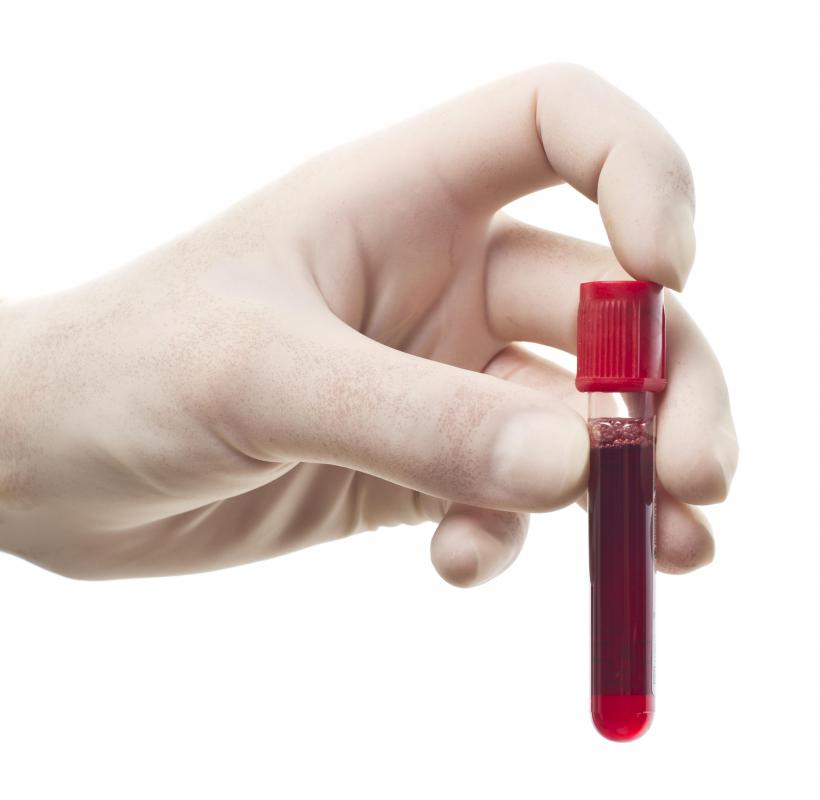At TheHealthBoard, we're committed to delivering accurate, trustworthy information. Our expert-authored content is rigorously fact-checked and sourced from credible authorities. Discover how we uphold the highest standards in providing you with reliable knowledge.
What is the Dexamethasone Suppression Test?
The dexamethasone suppression test is a blood test used to diagnose Cushing syndrome. This condition develops when the adrenal glands produce too much of a hormone called cortisol. Cushing syndrome usually is the result of pituitary gland dysfunction, but it can have other causes. There are two types of dexamethasone suppression tests: a high-dose test and a low-dose test. The low-dose test is used for diagnosing Cushing syndrome, and the high-dose test helps to pinpoint the cause of the increased cortisol levels.
Blood cortisol levels are partially regulated by the production of a pituitary hormone called adrenocorticotropic hormone, or ACTH. The relationship between ACTH and cortisol is called a negative feedback loop, because high levels of each substance reduce production of the other. This relationship is important in the dexamethasone suppression test.

Dexamethasone is a synthetic steroidal hormone that is structurally and functionally similar to cortisol. When someone with a normally functioning pituitary gland takes dexamethasone, ACTH is reduced; this in turn reduces cortisol levels. The dexamethasone suppression test therefore measures the ability of dexamethasone to suppress cortisol production. In someone with a dysfunctional pituitary gland, the response to dexamethasone is abnormal. For example, if the pituitary gland over-produces ACTH, taking dexamethasone might have no effect on cortisol levels.

The dexamethasone suppression blood test can be carried out overnight or over a period of three days. In the overnight test, a patient is given a dose of dexamethasone in the evening, and the next morning a blood sample is taken for cortisol testing. In the three-day test, the patient must collect his or her urine for three days after taking dexamethasone. In addition, he or she will receive additional doses of dexamethasone over the three days. The patient will receive high or low doses of dexamethasone depending on whether he or she is undergoing the high-dose or low-dose suppression test.

Prior to the test, a patient might be asked to stop taking certain drugs that could affect the results of the test. These include corticosteroids, estrogens, oral birth control and barbiturates. This test has very few risks, because the most invasive part of the procedure is a blood test. Possible side effects include excessive bleeding, infection and hematoma. The risk of any of these events occurring is very low.

In most cases, a person will first undergo a low-dose dexamethasone suppression test. The results of this test indicate whether a person has abnormal cortisol levels. Because abnormal levels of cortisol can have different causes, the high-dose test is carried out as a follow-up. For example, if abnormal cortisol levels are caused by a pituitary tumor, a patient will have an abnormal reaction to the low-dose test and a normal reaction in the high-dose test. If the abnormal cortisol levels are because of an adrenal tumor, the patient will respond abnormally to both the low-dose test and the high-dose test.
AS FEATURED ON:
AS FEATURED ON:














Discussion Comments
I was on advair discs for two and a half years, and all of a sudden, I got cramping, spasms, mild hyonatremia, felt hyper; it was awful. I did not realize when on it that I kept falling asleep all the time and breathing worse.
Then I switched to flovent discs, 100mg. I could only take it once a day and kept slurring my speech and falling asleep. I could not stay awake. Then after a few months, I got same symptoms: very hyper, tachycardia, could not sleep. It seems flovent is now suppressing the adrenal glands. Then I get a rush of (I think) cortisol and I lose weight. I have lost 41 pounds in five months. I lost eight more since early March.
I believe I have been going into adrenal crisis with no help since I have no diagnosis. Is this possible?
About my dexamethasone test. I did do an ACTH test on my own, but my suppression test will be done almost a month later. Also my test will not be in my record. Will my ACTH test do any good or should another be ordered?
I am getting a dexamethasone suppression test. I will take 2 0.5 mg of dexamethasone at 11 p.m., then will get blood drawn in the morning but no ACTH test has been ordered with this test. Will the results even show anything?
Post your comments